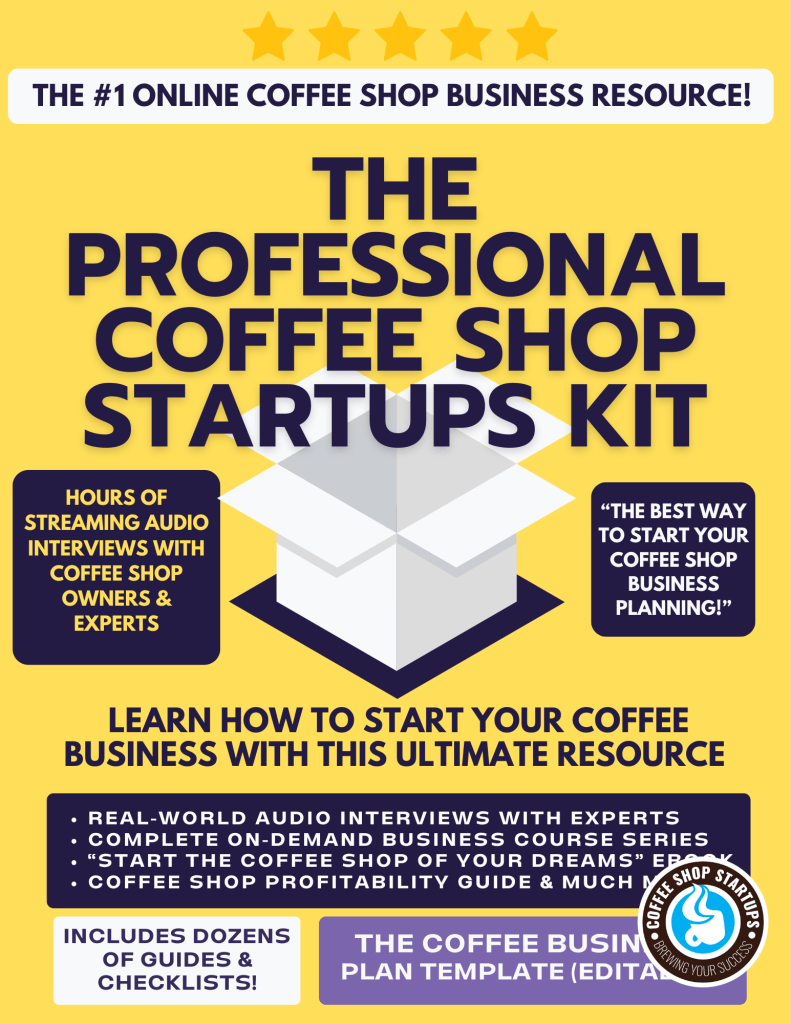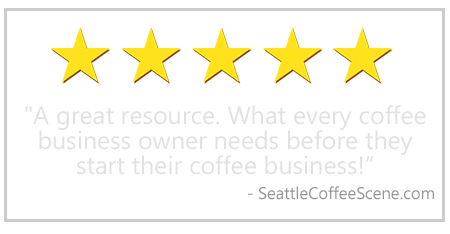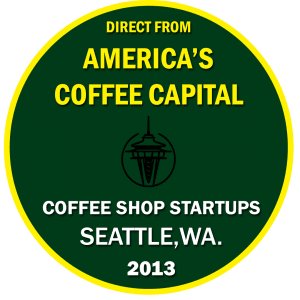Should You Open a Coffee Shop Franchise Business?
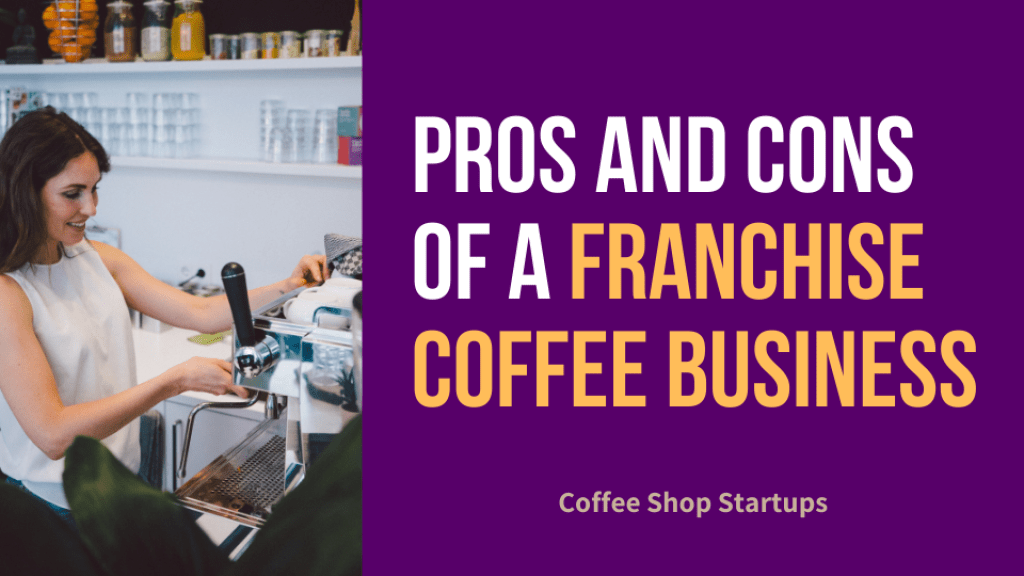
Disclaimer: We don't issue legal advice. The following is for informational and educational purposes only.
Should You Invest in a Franchise?
 There are many ways to open a coffee shop. One way to open your coffee shop is by becoming part of a franchise.
There are many ways to open a coffee shop. One way to open your coffee shop is by becoming part of a franchise.
According to the dictionary, a straightforward definition of a franchise is the right or license granted to an individual or group to market a company's goods or services in a particular territory.
This business model is common for a variety of industries, including restaurants and coffee shops. You may have heard about companies like Dunkin’ Donuts, The Coffee Bean and Tea Leaf, Scooter’s Coffee, Dunn Brothers Coffee, and Gloria Jean’s Coffees. These are all successful coffee shop franchises.
The most famous coffee chain is Starbucks.
Starbucks is not a franchise. It owns all its 15,149 locations in the United States and 30,626 stores globally (at this writing).
The growing demand for coffee has been apparent over the last decade, and it’s projected to continue to grow. The size of the coffee shop industry within the United States reached 47.5 billion U.S. dollars in 2019. The numbers show growth of 3.3 percent from the previous year.
High demand for coffee has led to a boom in various coffee shop franchises. This means that those who don’t have any retail coffee experience but have significant capital can still start a coffee shop. Starting a coffee shop business is a dream for many. However, taking full responsibility for starting your own coffee shop from scratch is difficult for many to muster. If this is the case, this is where having a coffee franchise helps you enter the market.
Coffee shops have become the place where we meet with our friends, go on dates, and meet with business partners. People everywhere demand the opportunity for coffee shops. People also like stability and consistency, which is an aspect of the franchise industry.
But is buying into a franchise really worth it? To answer these questions, we need to review the pros and cons of a franchise coffee business.
Pros and Cons of a Franchise Coffee Business

Pros of a Franchise Coffee Business
Market awareness.
A well-established coffee shop brand will often attract customers familiar with the business. Familiarity is appealing. As a business owner, you generally may not need to spend money upfront to promote your brand. However, you may need to agree to spend a certain percentage of your sales on marketing.
It is common for big franchises to invest a lot into their branding and marketing (sometimes more than the quality of their drinks). A solid brand reputation will help you stay competitive with other coffee shops.
Moreover, customers feel “safer” with big names. Building trust with your brand is a big deal, especially for small independent coffee shops. It will take time to market and strengthen your brand until people start to recognize you as “a coffee shop with great coffee.”
So, if a new customer has to choose between your coffee shop and a chain one, he or she might opt for the latter since “big” names are safer, reliable, and you know what to expect. People value consistency, even if it means mediocre.
Corporate marketing.
New coffee shop owners can often find themselves initially struggling to attract new customers. Marketing costs can siphon much essential money early on and be tough for small businesses to sustain. As a result, many coffee shop owners choose not to run large marketing campaigns on TV, radio, or online. In fact, most coffee shops have very few resources to have any marketing at all.
Once you become a part of a coffee franchisee, you may have a marketing plan provided by your franchisor. To be more precise, when a company launches a marketing campaign, you are automatically a part of it. (Keep in mind that you may partly fund this on a monthly or quarterly basis.)
Generally, the franchise controls all the marketing costs and creatives. It provides business owners with printed materials (like posters, leaflets, cards, etc.), updates the coffee menu board, and other supplies with branded merchandise.
As mentioned, you must invest in marketing if you are a franchisee. Depending on your support level, your franchise representatives will instruct you on staying consistent and profitable with each marketing campaign.
Training programs.
Franchises are well known for standardized coffee drinks and customer service. This can only be achieved by universal barista and staff training. Often, franchisors have their own barista recruitment and training programs, so you don’t need to look for baristas and train them yourself.
Even if you find your own baristas, they must undergo the same barista training program as everyone else within the franchise. This can ensure the consistency of products across the chain.
Business support.
If you don’t have any coffee business experience, you may often get valuable advice from your franchisor.
While they won’t sign your lease, you can get recommendations on determining the best location that will work for your business.
They will often require you to buy coffee equipment through them and provide you with a general employee handbook. Some franchises may have many locations in their sights to sub-lease a location to you.
However, remember, a franchisor charges you for everything it does for you, including additional support levels.
Lower equipment and supply costs.
Since franchises often have relationships with equipment manufacturers, sales reps, or suppliers, they may get discounts that they pass on to you. Of course, they will skim a little off the top to make sure their time and effort are profitable.
This may be good or bad for you. For example, if you find a cheaper inventory supplier, you may not be allowed to buy them because a franchise wants to ensure consistency by using the same espresso machines, grinders, coffee roasts, milk, and syrups.
Exit strategy.
A franchise agreement generally provides you with an exit strategy that you need to read carefully. It will likely contain a clause on the subject of your resale options. Such a clause may address when, how, and to whom you can sell your coffee shop franchise.
Less risk.
As a franchisee, you basically pay for turnkey business: a ready-to-go coffee shop concept, customer base, loyalty programs, and others' expertise. With a detailed coffee shop business plan ready on the table, you decrease the risk of failure, losing profits, or even bankruptcy.
All the factors mentioned above allow you to access product discounts, an already established customer base, save on marketing efforts, etc.
Franchise Coffee Business? Is It Right For You?
Cons of a Franchise Coffee Business
 High initial fees.
High initial fees.
Franchise businesses often have high fees. These franchise fees are often a significant part of your coffee shop startup costs. The cost may be significantly higher than simply opening a coffee shop from scratch.
With a coffee shop franchise, you pay premium costs for the brand name's use and licensing. Additionally, you will pay for support during the planning and initial stages of the operation.
Minimum franchise investments can be anywhere from $10,000 to $250,000 and reach almost $1,700,000 (for example, with Dunkin’). The more support a franchise offers, the more you’ll pay. Nothing is free with a franchise business.
While your franchisor may help secure a better deal on your coffee shop equipment and inventory, provide location advice, and instruct about obtaining all necessary permits and licenses, you still need money to pay for all that.
Some franchises might require you to get even more equipment and a bigger space, requiring more investment. Additionally, a franchisor will require you to pay for the café design and layout build-out.
High ongoing royalties.
As a franchisee, you may likely be required to pay royalty fees. These royalty fees may be about 6% of your sales or a fixed weekly/monthly fee. We’ve talked to some coffee shop owners who were unhappy that a franchisor took a significant percentage of the turnover without being really engaged with daily activities. In some instances, a few of the franchisors didn’t provide the level of promised support. This was unfortunate because business owners often depend on them in many aspects of the cafe business.
Some franchises charge an additional fee for marketing and advertising. Corporate marketing is universal for all coffee shops in the chain. It doesn’t consider your local market's demands, the customer base in your area, and the trends in your locale. It’s just not targeted specifically at your coffee shop. While it can successfully bring customers to some coffee shops, it might not benefit others.
Limited product options.
As a franchisee, you have to buy all coffee and inventory through your franchisor or one of their vendor partners. You might know a local coffee roaster who sells delicious coffee for a fair price, but you can’t collaborate with him since your franchise agreement legally binds you.
Additionally, you may want to serve coffee in biodegradable cups, and again, you can’t do it because you have to get branded coffee cups from your franchisor.
Working under a franchise is tricky if you want to satisfy your target market's demands.
In all likelihood, you will only be able to sell those drinks that the franchise offers or licenses and the prices they approve of. Even if your target market doesn’t like it or can’t afford it, you must stick with what the head office says. Any deviations from the menu and you can be penalized with yet another fee.
Not catering to the local market can significantly limit the customer flow to your coffee shop and your revenue numbers. The lack of flexibility will make it more difficult for you to reach profitability.
Franchise Coffee Business
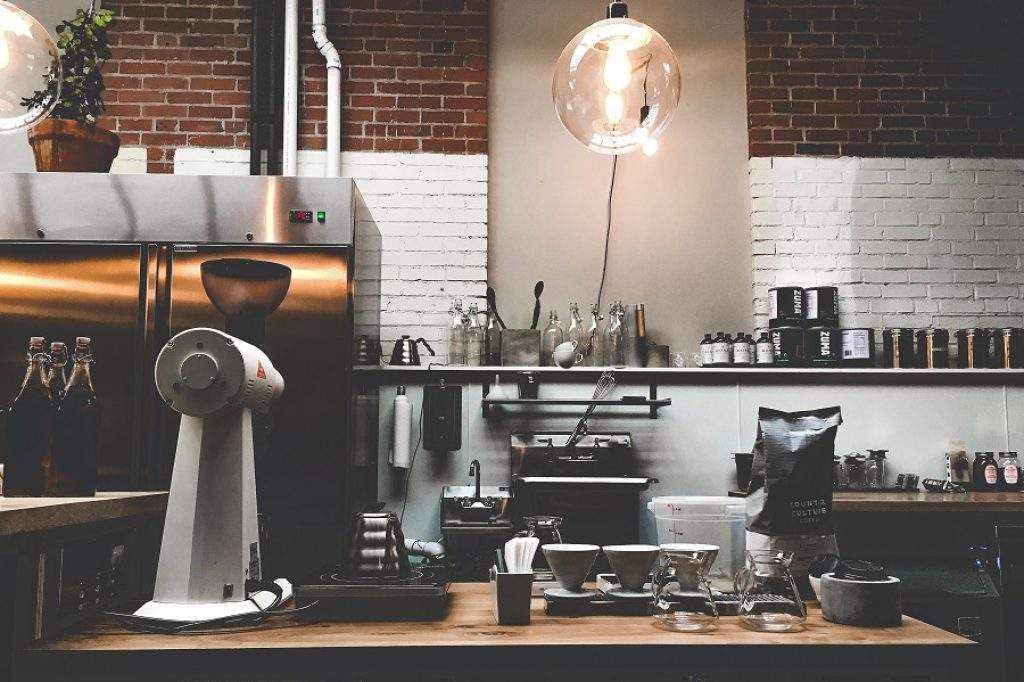
No freedom.
A franchisor requires you to strictly follow the guidelines and the company's policies as laid out per the signed agreement. This means you need to place a logo exactly how the head office wants and use the exact colors. You may need to operate in a pre-chosen location that the franchisor agrees to. Additionally, you and your employees might have to wear standard uniforms and shoes. Unless otherwise stated, you cannot make any changes to the coffee shop design and layout. Even if you have a great marketing idea and approach your franchisor with it, the chances are meager to implement it.
After signing the franchise agreement, you are legally obligated to comply with the corporate rules and procedures fully. You don’t have any freedom to manage your business how you want it. In a way, you basically become someone else’s employee. Except you get to pay for the privilege.
You and your coffee shop business will always be under the thumb of your franchisor. All the financial information, profit, and loss statements must be reported to the franchisor.
Is it worth investing all this money just to be told what to do? Maybe.
Sub-leasing is another important aspect you need to remember. Often, franchisors make you sub-lease coffee shop premises from them, which ties you to them for many years.
“Cookie-cutter” customer experience.
The coffee shop chains are often criticized for the lack of a personal touch. In some cases, they don’t have the personality and the unique vibe typical for indie coffee shops with individual designs. Even though many chain coffee shops have attempted to create a local feel, they still have to follow the company's standard procedures.
Standard customer experience starts with greeting customers to the same layout and interior, which gets boring.
You want your coffee shop to be remembered for something that no one else has: this can be your coffee shop design, the choice of materials, lightning, barista outfit (like bikini baristas), one-of-a-kind drink recipe, or unusual coffee shop marketing (check out Death Wish Coffee Company) – something that really stands out in the competition.
Inconvenient exit strategy.
The franchise agreement is usually signed for 5 to 20 years. As we mentioned above, some franchisors may offer a comfortable exit strategy when you can easily sell your franchise. However, this may be the exception than the rule. Many franchisors don’t want you to get out of the game easily, so they may make it very challenging to sell your rights to the business. They pose several restrictions on when, how, and who to sell to. Selling your franchise may be a very costly and challenging thing to do. You may need to stick with the franchiser that you don’t like for many more years not to go bankrupt.
Think of it like a time-share that you can’t break free from.
After your franchise agreement expires, you are left with no legal right to the company’s name or its goodwill. You are left without your own brand that you could build upon to expand your business.
Of course, you may have gotten valuable experience running a coffee shop and can start one yourself, but you can’t return the time spent working hard for someone else.
Dependence on the franchisor's success.
While many coffee shop franchises are successful, some fail to stay in business. If, for some reason, the brand and goodwill are shaken, your business might feel it.

Starting Your Franchise Coffee Business
Is It Worth Paying For The Coffee Shop Franchise?
Maybe. Purchasing a coffee shop franchise might seem like a promising endeavor and a smart investment in your capital. But it may be a costly one.
If you value your own freedom of expression, if you believe in your coffee shop concept, if you want to deliver a product that benefits your community – then you should consider starting your own coffee shop.
We strongly believe that you can be more successful than a franchise part if you prepare and plan.
When purchasing a coffee franchise, you still need to go through the actual process of opening a coffee shop. This includes finding a perfect location, signing up a lease agreement, and building a coffee shop. It may also include drawing up your floor plan, getting licensed by health and building departments, and establishing contacts with vendors and suppliers. Training your baristas will also be an important step that needs to be completed.
Even though you may receive some support in the initial stages, the price you pay for it may often seem unreasonable to most.
If you have to do it all, why not do it for yourself and start building your own brand from the beginning?
When compared to a franchise, your coffee shop startup shouldn’t be too expensive. If you lack funds, there are plenty of low-cost coffee shop ideas you can start with.
To summarize, we added a Pros and Cons table below:
Franchise Coffee Business Pros and Cons Table
| Pros | Cons |
|---|---|
| 1. Market awareness | 1. High initial fees |
| 2. Corporate marketing | 2. High ongoing royalties |
| 3. Training programs | 3. Limited product options |
| 4. Constant support | 4. No freedom |
| 5. Lower equipment and supply costs | 5. Standard customer experience |
| 6. Exit strategy | 6. Inconvenient exit strategy |
| 7. Less risk | 7. Dependence on the franchisor success |

Ready to Get Started?
Start Your Dream Coffee Shop Business
Starting a coffee shop is exciting, but it can also feel overwhelming. Where do you start? What steps should you take? How do you avoid costly mistakes? That’s where the Professional Coffee Shop Startups Kit comes in. It’s designed to give you a clear, practical roadmap to opening a successful coffee business—without wasting time or money on guesswork.
Inside, you'll find:
![]() Expert interviews with real coffee shop owners and business experts.
Expert interviews with real coffee shop owners and business experts.
![]() An On-Demand 37-lecture course covering everything from business planning to daily operations.
An On-Demand 37-lecture course covering everything from business planning to daily operations.
![]() Editable coffee shop business templates, financial documents, checklists, and planning tools to keep you on track.
Editable coffee shop business templates, financial documents, checklists, and planning tools to keep you on track.
![]() A step-by-step startup guide that walks you through concept development, permits, branding, and more.
A step-by-step startup guide that walks you through concept development, permits, branding, and more.
![]() Cost-saving strategies to help you launch your coffee business on a budget.
Cost-saving strategies to help you launch your coffee business on a budget.
Whether planning a small coffee cart or a full-scale café, this kit is built to help you start confidently. Join the thousands of successful coffee entrepreneurs who started with a dream and a great plan. Your journey to coffee shop greatness begins right here!
Comprehensive. Proven. Affordable.
The Professional Coffee Shop Startup Kit
(Instantly Delivered To You)
* The information on this page is for educational purposes only. We do not offer legal or investment advice.



